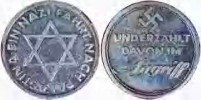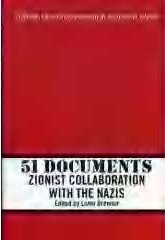In spite of the Kaiser’s deep interest in getting rid of the Jews, nothing could be done through Berlin. His diplomats always knew the Sultan would never agree to the scheme. In addition, the German Foreign Minister was not as foolish as his master. He knew Germany’s Jews would never voluntarily leave their homeland.
Herzl looked elsewhere, even turning to the tsarist regime for support. In Russia Zionism had first been tolerated; emigration was what was wanted. For a time Sergei Zubatov, chief of the Moscow detective bureau, had developed a strategy of secretly dividing the Tsar’s opponents Because of their double oppression, the Jewish workers had produced Russia’s first mass socialist organisation, the General Jewish Workers League, the Bund. Zubatov instructed his Jewish agents to mobilise groups of the new Poale Zion (Workers of Zion) to oppose the revolutionaries. [iii] (Zionism is not a monolithic movement, and almost from the beginning the WZO has been divided into officially recognised factions. For a list of the Zionist and Jewish organisations found herein, see the Glossary.) But when elements within the Zionist ranks responded to the pressures of the repressive regime and the rising discontent, and began to concern themselves about Jewish rights in Russia, the Zionist bank – the Jewish Colonial Trust – was banned. This brought Herzl to St Petersburg for meetings with Count Sergei Witte, the Finance Minister, and Vyacheslav von Plevhe, the Minister of the Interior. It was von Plevhe who had organised the first pogrom in twenty years, at Kishenev in Bessarabia on Easter 1903. Forty-five people died and over a thousand were injured; Kishenev produced dread and rage among Jews.
Herzl’s parley with the murderous von Plevhe was opposed even by most Zionists. He went to Petersburg to get the Colonial Trust reopened, to ask that Jewish taxes be used to subsidise emigration and for intercession with the Turks. As a sweetener for his Jewish critics, he pleaded, not for the abolition of the Pale of Settlement, the western provinces where the Jews were confined, but for its enlargement “to demonstrate clearly the humane character of these steps”, he suggested. [iv] “This would,, he urged, “put an end to certain agitation.” [v] Von Plevhe met him on 8 August and again on 13 August. The events are known from Herzl’s Diary. Von Plevhe explained his concern about the new direction he saw Zionism taking:
Lately the situation has grown even worse because the Jews have been joining the revolutionary parties. We used to be sympathetic to your Zionist movement, as long as it worked toward emigration. You do not have to justify the movement to me. Vous prêchez a un converti [You are preaching to a convert]. But ever since the Minsk conference we have noticed un changement des gros bonnets [a change of big-wigs]. There is less talk now of Palestinian Zionism than there is about culture, organisation and Jewish nationalism. This does not suit us. [vi]
Herzl did get the Colonial Trust reopened and a letter of endorsement for Zionism from von Plevhe, but the support was given solely on the proviso that the movement confine itself to emigration and avoid taking up national rights inside Russia. In return Herzl sent von Plevhe a copy of a letter to Lord Rothschild suggesting that: “It would substantially contribute to the further improvement of the situation if the pro-Jewish papers stopped using such an odious tone toward Russia. We ought to try to work toward that end in the near future.” [vii] Herzl then spoke publicly, in Russia, against attempts to organise socialist groupings within Russian Zionism:
In Palestine ... our land, such a party would vitalise our political life – and then I shall determine my own attitude toward it. You do me an injustice if you say that I am opposed to progressive social ideas. But, now, in our present condition, it is too soon to deal with such matters. They are extraneous. Zionism demands complete, not partial involvement. [viii]
Back in the West, Herzl went even further in his collaboration with tsarism. That summer, during the World Zionist Congress in Basle, he had a secret meeting with Chaim Zhitlovsky, then a leading figure in the Social Revolutionary Party. (World Zionist Congresses are held every two years, in odd years; the 1903 Congress was the sixth.) Later Zhitlovsky wrote of this extraordinary conversation. The Zionist told him that:
I have just come from Plevhe. I have his positive, binding promise that in 15 years, at the maximum, he will effectuate for us a charter for Palestine. But this is tied to one condition: the Jewish revolutionaries shall cease their struggle against the Russian government. If in 15 years from the time of the agreement Plevhe does not effectuate the charter, they become free again to do what they consider necessary. [ix]
Naturally Zhitlovsky scornfully rejected the proposition. The Jewish revolutionaries were not about to call off the struggle for elementary human rights in return for a vague promise of a Zionist state in the distant future. The Russian naturally had a few choice words to say about the founder of the WZO:
[He] was, in general, too “loyal, to the ruling authorities – as is proper for a diplomat who has to deal with the powers-that-be-for him ever to be interested in revolutionists and involve them in his calculations ... He made the journey, of course, not in order to intercede for the people of Israel and to awaken compassion for us in Plevhe’s heart. He traveled as a politician who does not concern himself with sentiments, but interests ... Herzl’s “politics” is built on pure diplomacy, which seriously believes that the political history of humanity is made by a few people, a few leaders, and that what they arrange among themselves becomes the content of political history. [x]
Was there any justification for Herzl’s meetings with von Plevhe? There can be only one opinion. Even Weizmann was later to write that “the step was not only humiliating, but utterly pointless ... unreality could go no further”. [xi] The Tsar had not the slightest influence with the Turks, who saw him as their enemy. At the same time, in l903, Herzl accepted an even more surreal proposition from Britain for a Zionist colony in the Kenya Highlands as a substitute for Palestine. Russian Zionists began to object to these bizarre discussions, and they threatened to leave the WZO, if “Uganda” was even considered. Herzl had a vision of himself as a Jewish Cecil Rhodes; it hardly mattered to him where his colony was to be situated, but to most Russian Zionists the movement was an extension of their biblical heritage and Africa meant nothing to them. A deranged Russian Zionist tried to assassinate Herzl’s lieutenant, Max Nordau, and only Herzl’s premature death prevented an internal collapse of the movement.
However, direct contacts with tsarism did not stop with Herzl. By l908 the ranks were willing to allow Herzl’s successor, David Wolffsohn, to meet the Prime Minister, Piotr Stolypin, and Foreign Minister Alexandr Izvolsky, over renewed harassment of the Colonial Trust bank. Izvolsky quickly came to terms on the minimal request and indeed had a friendly discussion with the WZO’s leader: “I might almost say that I made a Zionist of him,” wrote Wolffsohn triumphantly. [xii] But, needless to say, Wolffsohn’s visit led to no changes in Russia’s anti-Jewish legislation.
----------
i. David Yisraeli, Germany and Zionism, Germany and the Middle East, 1835-1939 (Tel Aviv University, 1975), p.142.
ii. Patai, Complete Diaries of Theodor Herzl, vol.III, p.729.
iii. George Gapon, The Story of My Life, p.94.
iv. Patai, Complete Diaries of Theodor Herzl, vol. IV, p.1521.
v. Ibid.
vi. Ibid., p.1525.
vii. Ibid., p.1538.
viii. Amos Elon, Herzl, pp.381-2.
ix. Samuel Portnoy (ed.), Vladimir Medem – The Life and Soul of a Legendary Jewish Socialist, pp.295-8.
x. Ibid.
xi. Weizmann, Trial and Error, p.82.
xii. Emil Cohen, David Wolffsohn, p.196.



No comments:
Post a Comment